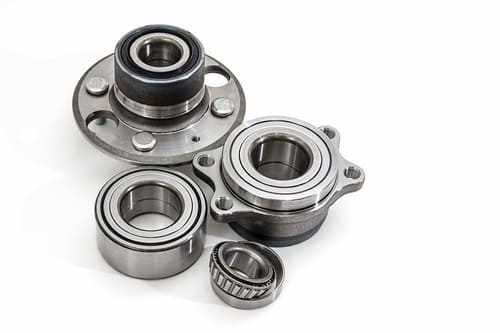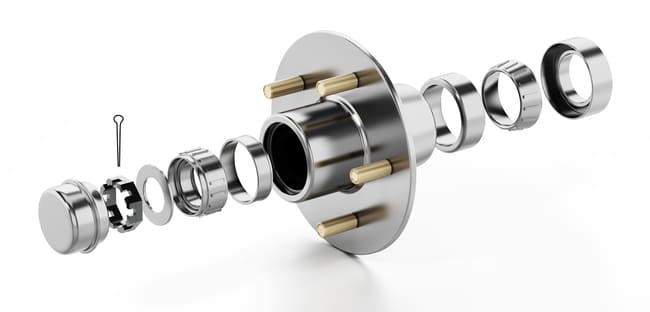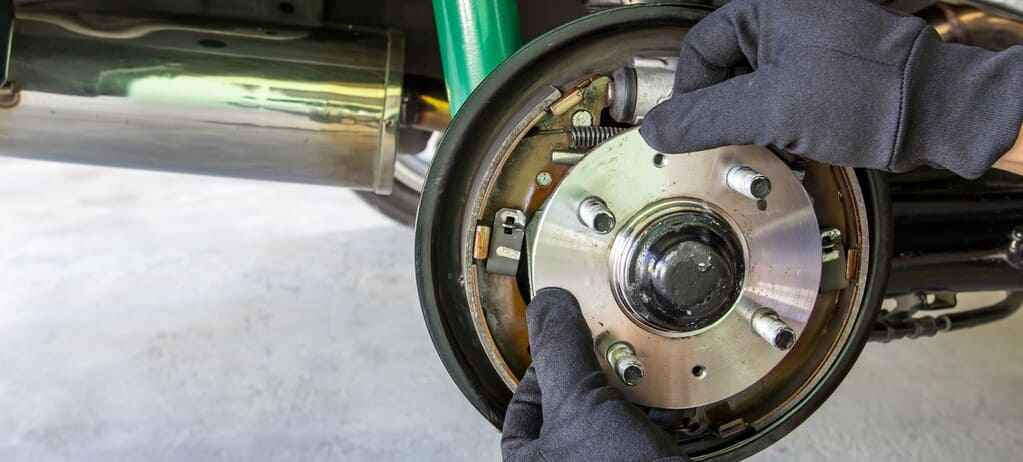When did you last check your wheel bearings? Ignoring the signs of a bad wheel bearing could cause a lot more trouble than you realise. Learn more in this guide.

What is a wheel bearing?
A wheel bearing is a crucial component that enables the car wheel to rotate smoothly. It usually consists of steel balls or rollers housed within a metal ring. The main purpose of the metal bearing is to support the weight of the vehicle and minimise friction between the wheel and its axle.
It is designed to withstand extreme forces encountered during driving, ensuring stability and manoeuvrability. Without it, the rolling friction of the wheel would be too intense, making it more difficult to turn the wheels and causing the assembly to wear out more quickly.

How to tell if a wheel bearing is bad
Standard wheel bearings are typically designed to last around 85,000 to 100,000 miles. However, this will depend on factors such as the quality of the parts, the driving environment and the road quality.
Common causes of premature failure include improper installation, road impacts, and harsh weather conditions. Driving through thick mud, water or slush can cause the bearings to rust or wear rapidly if the seals are not fully intact. Additionally, certain rim, tyre and suspension modifications can increase the load and stress on the bearings, i.e. fitting wider rims or stiffer car shock absorbers.
Symptoms of a bad wheel bearing:
- Uneven tyre wear
There are many reasons why tyres wear unevenly, such as poor wheel alignment, low tyre pressures and a worn suspension. A less known cause is a damaged or loose wheel bearing. Depending on how many bearings have failed, one or more tyres may be more worn on the outer or inner edges of the tread.
- Loose wheels
If the bearing is faulty, it may cause the affected wheel to wobble or feel loose. You can test this by grabbing the tyre from both sides and trying to shake it. This issue may also affect the stability and responsiveness of the car's steering system. Other causes of looseness include excessive play in the suspension.
- Abnormal sounds
This is normally the first sign of a bad wheel bearing that people notice. You may hear a strange humming, popping or grinding noise coming from the wheels as you drive. The grinding sound is usually due to the metal parts of the assembly, i.e. the bearing housing and the hub, rubbing against each other or to a lack of lubrication.
Some people report a rumbling or growling noise when turning corners. This usually comes from the wheels on the outer side of the turn.
- Vibrations
In addition to a noisy wheel bearing, the faulty part can cause vibrations in the steering wheel and throughout the vehicle. The vibrations may become more intense when accelerating.
- ABS warning light
If your car comes with an anti-lock braking system, it’s possible that bearing problems could trigger the ABS warning light on the dashboard. This is due to its potential impact on the system’s speed sensor signals and readings.

Can you drive with a bad wheel bearing?
It may be possible to drive short distances with a faulty wheel bearing, although it is generally advised against. Continuing to drive can worsen symptoms and lead to more extensive damage, which means more expensive repairs. Moreover, it increases the risk of the wheels locking or the driver losing control of the wheels.
For this reason, if you suspect that it’s time to get a new front or rear wheel bearing for your car, we recommend that you install the new parts sooner rather than later.
How much does it cost to replace a wheel bearing?
The average cost to replace a wheel bearing in the UK is around £210, with prices typically ranging between £180 and £350. This amount will vary depending on where you get the work done, the extent of the damage, and the make and model of the vehicle.
Replacing the bearings yourself may end up saving you money, as long as it’s done properly. Online prices for aftermarket wheel bearing kits can range from £40 to over £85. Shopping online will help you to compare prices and find the best deals.
To find compatible parts for your vehicle, simply search using relevant keywords, e.g. Ford Focus wheel bearing, or the OEM number of the part.
TOP products on the subject:









































